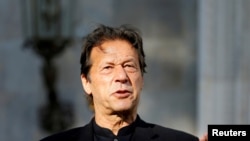Pakistan’s prime minister warned Wednesday that if warring parties in Afghanistan fail to reach a peace arrangement, “anarchy” will erupt in the turmoil-hit neighbor after the withdrawal of the United States and allied troops, threatening regional stability.
Imran Khan issued the warning a day after Washington said almost half of U.S. troops and equipment had been sent home or destroyed since the drawdown formally began on May 1.
The withdrawal is the outcome of a February 2020 deal the U.S. negotiated with the Afghan Taliban, which is waging a deadly insurgency against the internationally backed Kabul government.
“It is very important for Afghanistan to have a political settlement and stability when the Americans leave and a government with consensus is established that could prevent the country from descending into anarchy,” Khan said.
The Pakistani leader spoke at a news conference in Islamabad with visiting President Emomali Rahmon of Tajikistan, which also borders Afghanistan. He stressed the need for regional countries to jointly push the Afghan political reconciliation, saying it would help boost much needed regional trade and economic links.
“We are concerned that when the Americans leave, and there is no political settlement, a situation may arise similar to the aftermath of the Soviet departure from Afghanistan, which will be detrimental to Pakistan and other neighboring countries,” Khan said. The prime minister also said Pakistan fears terrorism will rise without a political settlement.
Islamabad maintains that anti-state militants have taken refuge in Afghan territory after fleeing Pakistani security operations and continue to plot cross-border terrorist attacks from there.
For its part, the Kabul government accuses Pakistan of covertly supporting the Taliban and allowing insurgent leaders to direct violence inside Afghanistan, allegations Pakistani officials deny.
The allegations and counter-allegations are at the center of long-running tensions and suspicions between the two countries that share nearly a 2,600-kilometer border.
The United States credits Khan’s government with arranging the negotiations with the Taliban that culminated in the landmark troop withdrawal deal a year ago, ending nearly two decades of war between the two foes.
The pact encouraged the insurgents to open peace talks in Qatar last September with a team representing the Kabul government.
Islamabad takes credit for persuading the Taliban to engage in what is officially dubbed the intra-Afghan negotiations. The dialogue has mostly been deadlocked, however, with each side blaming the other for stalling the peace process.
Highly placed Pakistani official sources told VOA Tuesday that Islamabad has played a role in breaking the impasse, and the Afghan rivals are expected to return to the negotiating table later this week, possibly Thursday, to discuss a reduction in deadly battlefield hostilities in Afghanistan, among other pressing issues.





